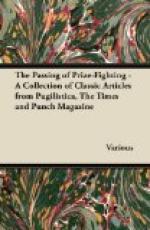[Illustration]
Introduction.
I cannot recollect the precise day, but it was some time in the month of November 1839, that I took one of my usual rambles without design or destination. I detest a premeditated route—I always grow tired at the first mile; but with a free course, either in town or country, I can saunter about for hours, and feel no other fatigue but what a tumbler of toddy and a pipe can remove. It was this disposition that made me acquainted with the fraternity of the “Puffs.” I would premise, gentle reader, that as in my peregrinations I turn down any green lane or dark alley that may excite my admiration or my curiosity—hurry through glittering saloons or crowded streets—pause at the cottage door or shop window, as it best suits my humour, so, in my intercourse with you, I shall digress, speculate, compress, and dilate, as my fancy or my convenience wills it. This is a blunt acknowledgment of my intentions; but as travellers are never sociable till they have cast aside the formalities of compliment, I wished to start with you at the first stage as an old acquaintance. The course is not usual, and, therefore, I adopt it; and it was by thus stepping out of a common street into a common hostel that I became possessed of the materiel of those papers, which I trust will hereafter tend to cheat many into a momentary forgetfulness of some care. I have no other ambition; there are philosophers enough to mystify or enlighten the world without my “nose of Turk and Tartar’s lips” being thrust into the cauldron, whose
—“Charms
of powerful trouble,
Like a hell-broth, boil and bubble.”
I had buttoned myself snugly in my Petersham (may the tailor who invented that garment “sleep well” whenever he “wears the churchyard livery, grass-green turned up with brown!”) The snow—the beautiful snow—fell pure and noiselessly on the dirty pavement. Ragged, blue-faced urchins were scrambling the pearly particles together, and, with all the joyous recklessness of healthier childhood, carrying on a war less fatal but more glorious than many that have made countless widows and orphans, and, perhaps, one hero. Little round doll-like things, in lace and ribbons, were thumping second-door windows with their tiny hands, and crowing with ecstasy at the sight of the flaky shower. “Baked-tater” cans and “roasted-apple” saucepan lids were sputtering and frizzing in impotent rage as they waged puny war with the congealed element. Hackney charioteers sat on their boxes warped and whitened; whilst those strange amalgams of past and never-to-come fashions—the clerks of London—hurried about with the horrid consciousness of exposing their costliest garments to the “pelting of the pitiless storm.” Evening stole on. A London twilight has nothing of the pale grey comfort that is diffused by that gradual change from day to night which I have experienced when seated by the hearth or the open window of a rural




